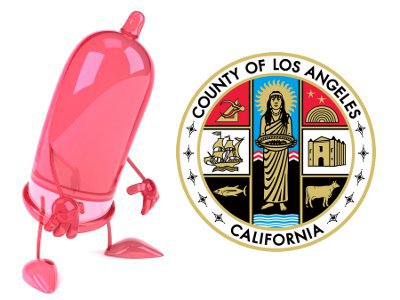Judge Issues Split Ruling on Measure B
 LOS ANGELES – The U.S. District Judge presiding over the adult entertainment industry’s lawsuit against Los Angeles County’s mandatory condoms ordinance ruled some of the law’s provisions unconstitutional while green-lighting the basic concept.
LOS ANGELES – The U.S. District Judge presiding over the adult entertainment industry’s lawsuit against Los Angeles County’s mandatory condoms ordinance ruled some of the law’s provisions unconstitutional while green-lighting the basic concept.
However, because Judge Dean D. Pregerson struck down some definitions and granted a preliminary injunction against most of the enforcement provisions, the Safer Sex in the Adult Film Industry Act — known colloquially as Measure B — has been rendered somewhat toothless.
Los Angeles County has a vested interest in protecting the health of its citizens, Pregerson wrote in his 34-page Vivid v Fielding decision, and nothing about requiring performers to wear condoms when participating in sexually explicit scenes violates constitutional guarantees, he noted. Where the county overstepped its bounds was in granting enforcement agents too much discretionary power to revoke permits, conduct warrantless searches and assess fines. Those enforcement provisions seemed especially troubling to Pregerson because Measure B requires no judicial oversight for any of them. Consequently, the judge struck down those clauses, noting that the county may levy fines, search premises and revoke permits, but only with a court’s permission.
In striking down the enforcement provisions, Pregerson also limited the definition of “barrier protection” to condoms. He elaborated upon that definition in another portion of his decision in which he questioned the ordinance’s definition of “adult film.”
“Although Plaintiffs have not raised the issue, the following clause of the ‘adult films’ definition is problematic: ‘and/or any other sexual activity that may result in the transmission of blood and/or any other potentially infectious materials,’” Pregerson wrote in his ruling. “The use of ‘or’ indicates that filmed ‘sexual activity’ that ‘results in the transmission of … other potentially infectious materials’ requires a Measure B permit. Sexual activity could mean many things. Potentially, kissing could qualify, as saliva may contain infectious materials. Therefore, the portion of adult film’s definition discussed in this footnote is unconstitutionally overbroad and vague.”
Vivid Entertainment co-chairman Steve Hirsch admitted Pregerson’s ruling seems largely positive for the adult entertainment industry, but he continues to want Measure B thrown out in its entirety.
“We won most everything we sought to be determined unconstitutional with Measure B,” Hirsch noted in a statement responding to the decision. “We are, however, disappointed the court found it necessary to rewrite a portion of the [law] in order to salvage a small portion of the measure and refused, at this time, to accept the adult industry’s own regulations by imposing an unfunded mandate upon [Los Angeles County].
“We continue to believe this unfunded mandate infringes upon our freedom of speech, and we will continue our fight by filing an immediate appeal to this portion of the court’s ruling,” Hirsch added.
Vivid, along with performers Kayden Kross and Logan Pierce, filed the lawsuit in January, only weeks after Measure B took effect. The law, which among other things requires adult performers to wear so-called barrier protection when shooting sexually explicit scenes and mandates special permits for adult productions, resulted from a ballot measure approved by voters in November 2012.









